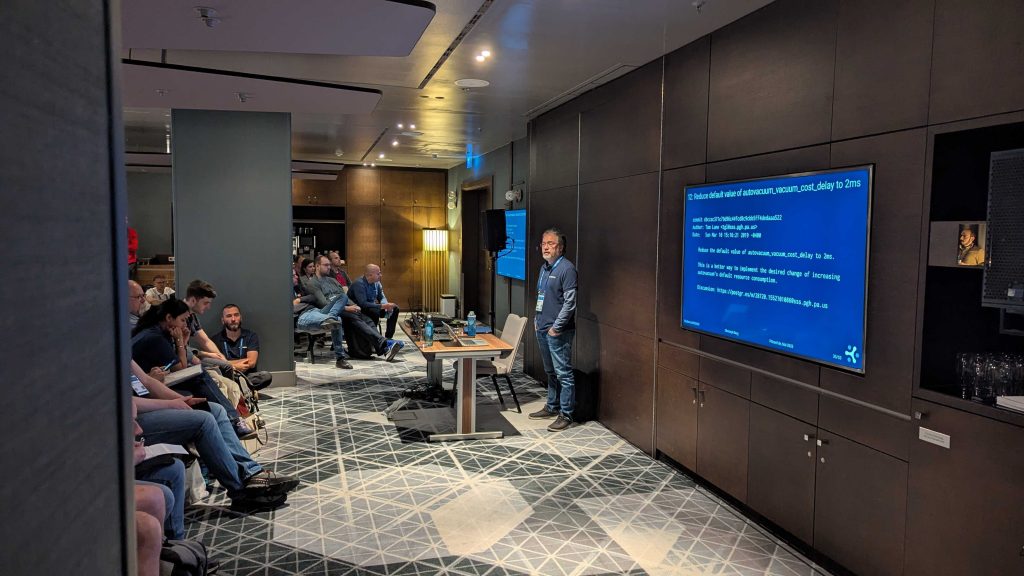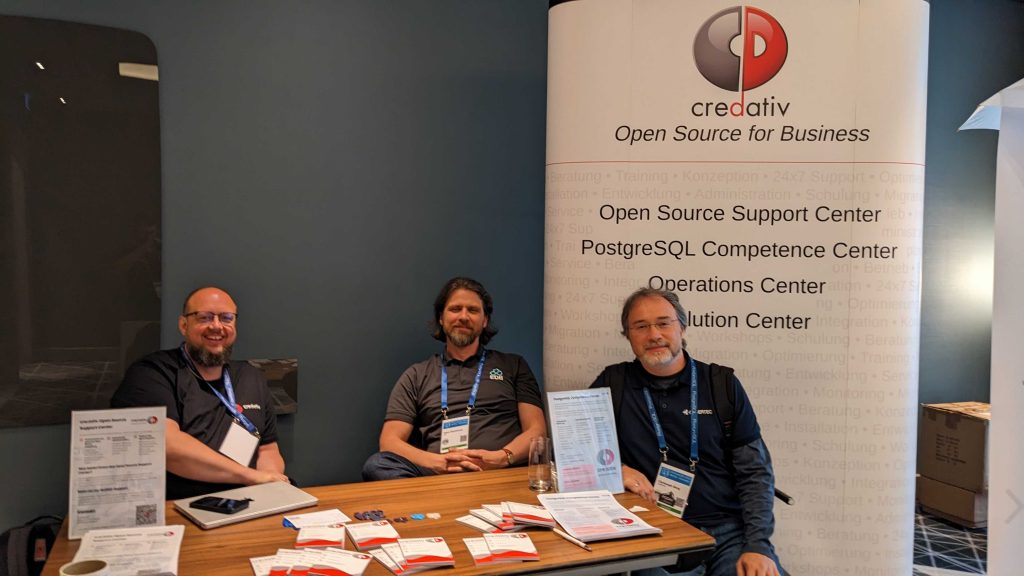Table of Contents
The week before this year's PGConf.DE, I attended the Debian MiniDebConf in Hamburg. Adding Berlin to the itinerary made for a busy two weeks on the road. Still, it gave me time to prep for my PGConf talk while catching up on Debian-related discussions.
We hit the road to Berlin the day before the conference. My colleague Bernd Helmle drove, and after a relaxed six-hour ride, we arrived. The venue was familiar — the same as PGConf.EU 2022 — a hotel with a large conference floor built around a sprawling atrium. While rooms were somewhat dispersed, the layout helped accommodate the crowd of 340 attendees comfortably.
Andreas "ads" Scherbaum kicked off the event with characteristic German punctuality: “We are in Germany, let’s start on time!”
First up, I sat in on Bernd Patolla's session on migrating from Oracle to PostgreSQL. Honestly, I was distracted, as I was still polishing slides for my own talk.
I then partially tuned into Sergey Dudoladov’s session on the life cycle of a query in PostgreSQL — again, nerves and last-minute edits dominated.
However, I fully engaged with András Váczi’s practical insights into running PostgreSQL on Windows. From backup headaches to tool compatibility, it was a reality check on cross-platform database management.
Read Andras Vaczi's talk on running PostgreSQL on Windows here.
In my own session, Modern VACUUM, I explored the evolution of PostgreSQL’s VACUUM and autovacuum processes. The talk stemmed from internal CYBERTEC consulting team discussions: VACUUM has changed a lot, and I needed to catch up and share that knowledge.

Highlights from my talk included:
I wrapped up just in time, with only a minute for questions — but feedback was very positive.
Read my talk on Modern VACUUM here.
Peter Eisentraut followed with Modern SSL, tracing PostgreSQL’s encryption feature timeline. Like my talk, it used a “then, now, next” approach that really worked.
Laurenz Albe compared Oracle and PostgreSQL on ACID compliance. I learned that Oracle’s isolation levels are even messier than expected, as full serialisability is missing, and even repeatable read is riddled with gotchas. PostgreSQL, by contrast, handles many of these corner cases gracefully.
Read Laurenz Albe's talk on comparing the Oracle and PostgreSQL transaction systems here.
I used the next slot to reconnect with old colleagues from credativ, who are now independent again after a stint with VC ownership. It was great to see familiar faces. The day ended with platinum sponsor keynotes — mostly solid, though I had to leave one where the speaker kept saying “Postgre”.
The evening wrapped up with some great hallway chats and excellent red wine.
The morning didn’t have any compelling talks for me, so I joined the second slot. I had to choose between Devrim Gündüz (on extensions) and Álvaro Herrera (on SLRU internals). I went with the latter.
Álvaro’s deep dive into SLRU (Simple Least Recently Used) explained its overhaul in PostgreSQL 17 with better performance, tunable configs, and even rumors of future patches. I sent a photo of one such slide to my colleague Ants Aasma — the patch author — which sparked a mini remote collaboration right at the event.
Josef Machytka then tackled PostgreSQL’s confusing memory usage metrics. Shared buffers skew all memory-monitoring tools. The short-term fix? Patch every tool. The long-term one? TBD.
Polina Bungina walked us through the architecture and design trade-offs behind Patroni, the go-to high availability solution for PostgreSQL. Clear, concise, and valuable.
The lightning talks were a blast:

Valerie Kaplan, Diego Calvo de Nó, and Jan Karremans introduced the Open Alliance for PostgreSQL Education — a new initiative co-founded by CYBERTEC.
The goal: create standardized certification and training for PostgreSQL DBAs, possibly with shared course materials. Having taught PostgreSQL for years, I love this direction.
Andreas closed the conference, and we stayed the night in Berlin. The next day, our return trip was marred by a highway lockdown, turning a six-hour drive into a nine-hour ordeal.
But there was a silver lining, as we dropped off Julian, and he treated us to cake and drinks at his place.
PGConf.DE 2025 was packed with practical insights, deep technical dives, and meaningful community updates. From VACUUM evolution to HA architecture and DBA certification, PostgreSQL continues to mature — and conferences like this are essential to staying in the loop.
Leave a Reply